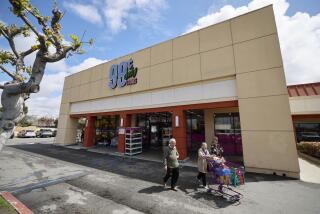Target Set to Sell Mervyn’s Chain
- Share via
Target Corp. announced plans Thursday to sell its Mervyn’s stores to an investment group for $1.65 billion, shedding its second department store chain this year to focus on its namesake business.
The deal completes a plan by the Minneapolis-based retailer to sell both the Mervyn’s and Marshall Field’s chains. Target agreed to sell Marshall Field’s and nine Mervyn’s stores last month to May Department Stores Co. for $3.24 billion.
Mervyn’s, based in the Bay Area city of Hayward, currently operates 257 stores, including 126 in California. The acquisition also includes four Mervyn’s distribution centers.
The investment group making the most recent purchase consists of Sun Capital Partners Inc., Cerberus Capital Management and Lubert-Adler/Klaff and Partners.
Michael Kalb, a principal with Boca Raton, Fla.-based Sun Capital, said he and his business partners planned to run Mervyn’s as is for now. “We are not changing the niche,” Kalb said.
The investment group, Kalb said, hopes to take advantage of the company’s name identity and loyal customer base.
“Mervyn’s is a strong franchise on the West Coast,” Kalb said. “People have grown up with Mervyn’s. They got their first credit card with Mervyn’s. We want to build on that.”
Sun Capital has an extensive portfolio of retail investments, including Wickes Furniture, Sam Goody and Bruegger’s Bagels.
Target put the Marshall Field’s and Mervyn’s chains up for sale in March to concentrate on its 1,272 Target stores.
“We feel we have an opportunity to increase our presence in the United States,” Target Corp. spokeswoman Cathy Wright said. “This is our growth vehicle, and we’re going to focus on it.”
Target also plans to sell Mervyn’s credit card receivables for about $475 million to General Electric Co.’s consumer finance unit.
The Mervyn’s sale, according to Wright, will allow Target to shrink its debt and repurchase stock. In June, Target announced plans to repurchase $3 billion of common stock over the next two to three years, she said. At the end of fiscal 2003, the company had $10.2 billion in long-term debt on its balance sheet.
Last month’s sale of the Marshall Field’s chain to May Department Stores surprised some analysts, who had speculated that the firm would be snapped up by May rival Federated Department Stores Inc. The deal is expected to help May gain leverage in negotiations with vendors and expand its distribution network.
The Mervyn’s deal was announced after the close of U.S. markets. Shares of Target ticked up slightly after hours after having risen 30 cents to $44.33 on the New York Stock Exchange.
More to Read
Inside the business of entertainment
The Wide Shot brings you news, analysis and insights on everything from streaming wars to production — and what it all means for the future.
You may occasionally receive promotional content from the Los Angeles Times.










